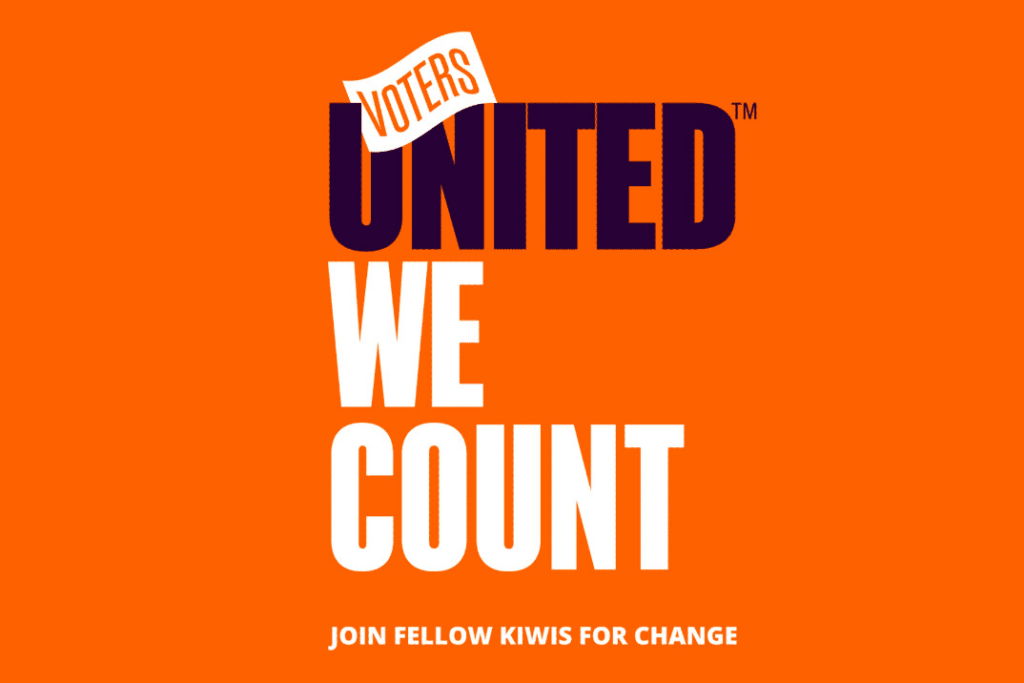In brief
- Polls show Labour and National and their potential partners are neck and neck.
- If anti-mandate voters combine behind one party they could be the difference.
- Brian Tamaki’s Freedoms NZ Party has combined 5 small parties; the Voters United initiative hopes to create further cooperation.
Too close to call
According to recent polls, Labour and National are neck and neck, well within the margin of error at around 35% each. ACT is polling a few % higher than Greens, at around 10%. Te Pāti Māori and NZ First are around 3% – they need to either win an electorate seat, or reach 5% of the party vote to enter Parliament. Te Pati Maori will but that is not currently in the cards for NZ First. With National ruling out a coalition with Te Pāti Māori, and NZ First ruling out Labour, the coalitions are set with Labour-Greens-Māori vs National-ACT-NZ First. Depending on the poll, each side has enough votes (barely) to become the next Government.
This means the outcome of the election may be dependent on Kiwis still undecided. Almost 20% of enrolled voters didn’t vote in the 2020 election, matching the record-low 2014 turnout.

Outside parties vye for the anti-mandate vote
The next-highest polling parties outside Parliament are The Opportunities Party (TOP) and New Conservatives, near 2% each. Next is Matt King’s DemocracyNZ, under 1%. As a National MP in 2017, King stole Winston Peters’ Northland electorate seat, but narrowly lost it in 2020 to Labour’s Willow-Jean Prime. DemocracyNZ can enter Parliament if King regains his electorate vote.
Brian Tamaki’s‘ “umbrella” party Freedoms NZ recently succeeded in uniting five small parties that gained popularity in the wake of the Government’s COVID policies, which many considered overbearing. These are Tamaki’s Vision NZ, centre-right New Nation Party, environmentally-focused Outdoors Party, and two unregistered parties Yes Aotearoa and Rock the Vote. Its polling position remains to be seen.
Every party in Parliament supported the COVID mandates, which look more dubious in the rear view mirror. Also, they refused to engage with the Parliament protest with the exception of ACT, who came around, after nine days, to hold a meeting offsite with a group of protestors to hear what they had to say. Consequently, some of the 30% of Kiwis who supported the protest are looking for another party – one more likely to listen to them. The number of such voters is unknown.
Twice as many of the protesters voted Labour than any other party. Also, the Greens and Te Pāti Māori had almost twice the proportion of voters at the protest as in the general population. So there’s a good chance people who would previously have voted left will either not vote or choose a party currently outside Parliament.
On the other hand, Chris Hipkins has more voters who favour him as Prime Minister than who don’t, and undecided voters dislike him less than the other party leaders in Parliament.
TOP opposed the Government’s massive COVID spending, but not the COVID mandates themselves. The aforementioned outside parties opposed the mandates.
Anti-mandate organisation Voices for Freedom potentially has over 200,000 supporters, almost as many as voted for Greens or ACT at the 2020 election (~225,000 each). They would therefore have a good chance of getting a party into Parliament if most of them voted the same way. Instead their votes look to be either undecided or split among the smaller parties: NZ First, New Conservatives, DemocracyNZ, FreedomsNZ, and the Christian ONE Party. An initiative called Voters United aims to combine their votes behind a single party. Their initial supporter poll found DemocracyNZ to be the most popular.





















